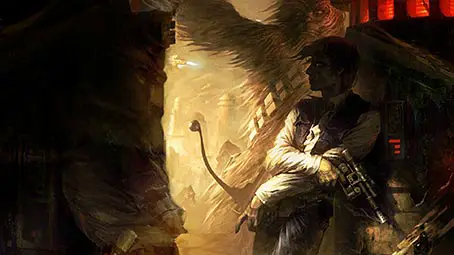

The black-and-white palette that covers most of "The Duel" is highlighted by select bright colors, drawing attention to the most interesting parts of the screen at any given time and giving extra drama to some mundane scenes, like an important pot of boiling water. The visuals here are striking CG characters are overlaid with gritty stylization that gives them an a look one could be forgiven for believing is 2D animation at first. This "period drama" of sorts is the first episode in the collection and fittingly so, as it takes Star Wars back to its Kurosawa-inspired roots. Considering the tone and aesthetic "T0-B1" goes for, it's hard to fault it too much for lacking an engaging narrative, but that is really the only thing holding it back from greatness. The team at Science SARU aren't afraid to make things feel bubbly and light for most of the runtime, expressing T0-B1's imagination through fun dreamlike sequences, and even a deadly fight against an Inquisitor at the end has a lovely sense of creativity to it, utilizing the short's style in every aspect of the production. The plot is as simple as the soft Tezuka-style designs, with convenient plotting reminiscent of a children's anime, but it resonates because of how easy it is to relate to T0-B1's starry-eyed idealism the way he sees the Jedi is how many fans might remember themselves seeing them as children, too. One of a few shorts in Visions that wears its influence on its sleeve, "T0-B1" uses its Osamu Tezuka-inspired characters and designs to tell the story of a young droid who dreams of being a Jedi one day. The psuedo-mystery is fun to watch, and there are cute ideas and action setpieces - a speeder fight and lightsaber battle royale are welcome visual treats - but what's left is a woefully incomplete story. Many of these stories don't really "end", but even among them "The Ninth Jedi" feels more like a pitch for a larger story than one that is satisfied with itself as-is. The story of stray wannabe Jedi meeting in response to a mysterious message promising to restore the Jedi Order is intriguing and comes with fun twists, but its very premise sets up a potential story so much bigger and more interesting that it's hard to ignore. "The Ninth Jedi" is fighting between these contradictory goals, and the end result isn't particularly satisfying in either direction. On the other hand, knowing you're writing for something as grand and sprawling as Star Wars, it's clearly hard to resist the urge to want to contribute to that. When it comes to short stories, there's an art to the brevity and sense of purpose that makes them work.

It feels like the very beginning of an interesting, tragic story, but without a continuation, it comes across as needlessly nihilistic and leaves a bad taste in my mouth. Yet despite all of this, Akakiri ends on a quite dour note, leaving Tsubaki at what must be his lowest point ever, the ever-present destiny he so passionately raged against made the victor for now. Luckily, with Science SARU's naturalistic, expressive designs and animation, it is easy to get in Tsubaki's headspace and empathize with him. Star Wars loves the concept of destiny, and destiny is what haunts Tsubaki for the entirety of "Akakiri's" runtime he fights against morbid visions of death and other mystical plots that stand in his way, waging a personal war to prove that he is his own master. That's definitely true of "Akakiri," the story of a Jedi named Tsubaki meeting up again with his old flame Misa to fight against her aunt, who has gone mad with dark side power.

It pains me to place such a unique, ambitious-feeling entry from this collection so low, but sometimes things simplly don't live up to their potential.


 0 kommentar(er)
0 kommentar(er)
